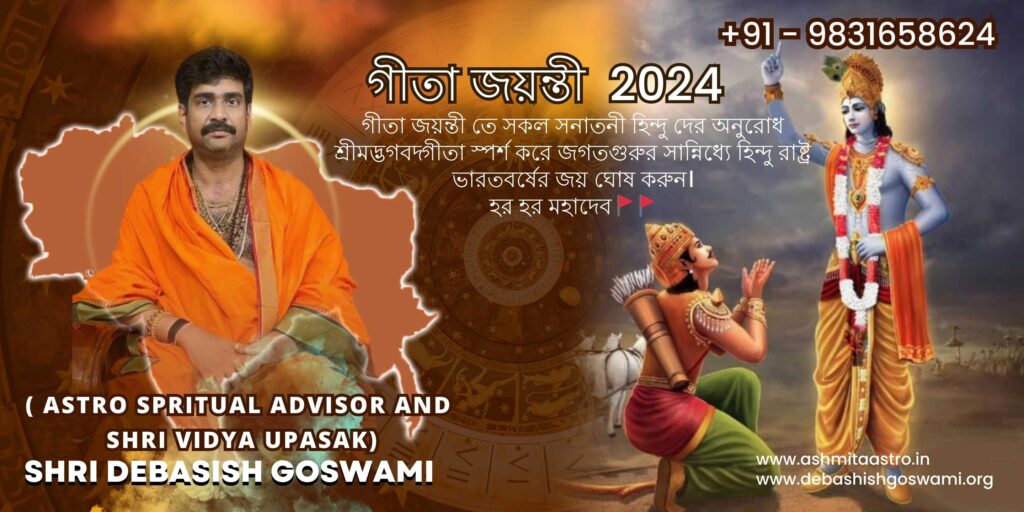Gita Jayanti marks the day when the Bhagavad Gita, one of the most revered Hindu scriptures, was revealed by Lord Krishna to Arjuna on the battlefield of Kurukshetra. It falls on Ekadashi Tithi of the Shukla Paksha (waxing phase of the moon) in the Hindu month of Margashirsha (November–December).
Significance:
- Message of Dharma: The Gita provides guidance on righteous living, selfless action, and devotion to God.
- Philosophical Insights: It addresses fundamental questions about life, duty, and spirituality.
- Global Impact: Its teachings transcend religious boundaries, offering wisdom to seekers worldwide.
Celebrations:
- Reading and Recitation: Devotees read or recite chapters from the Bhagavad Gita.
- Discourses: Spiritual leaders organize lectures and discussions on its philosophical teachings.
- Bhajans and Kirtans: Devotional music is performed in temples and spiritual centers.
- Charity: Acts of charity and community service are encouraged.
The Bhagavad Gita, often referred to as the Gita, is one of the most significant spiritual texts in the world. It is a part of the Indian epic Mahabharata and is presented as a dialogue between Lord Krishna and the warrior Arjuna on the battlefield of Kurukshetra.

Key Aspects of the Bhagavad Gita:
- Structure:
- The Gita consists of 700 verses divided into 18 chapters.
- Each chapter focuses on different aspects of life, spirituality, and duty.
- Core Themes:
- Dharma (Duty): Importance of performing one’s duty without attachment to the results.
- Karma (Action): The value of selfless actions and the concept of karma yoga.
- Bhakti (Devotion): The path of love and surrender to God.
- Jnana (Knowledge): The pursuit of self-realization and understanding the nature of reality.
- Meditation: The power of focus and controlling the mind.
- Philosophical Insights:
- It addresses existential questions like “Who am I?”, “What is my purpose?”, and “What happens after death?”
- Advocates for balance in life by harmonizing material and spiritual pursuits.
- Universal Relevance:
- Though rooted in Hindu philosophy, its teachings transcend religious boundaries.
- Leaders like Mahatma Gandhi, Albert Einstein, and Eknath Easwaran have drawn inspiration from the Gita.
Famous Verses:
- “Karmanye Vadhikaraste Ma Phaleshu Kadachana”
(You have the right to perform your duty, but not to the fruits of your actions.) - “Yada Yada Hi Dharmasya Glanir Bhavati Bharata”
(Whenever there is a decline in righteousness, I manifest to protect the good and destroy evil.)
Legacy:
The Bhagavad Gita continues to inspire people worldwide, offering timeless wisdom for personal growth, leadership, and spirituality.
Would you like to explore any specific chapter, verse, or teaching from the Gita in more detail? Contafc Astrologer Dr Debshish Goswami

